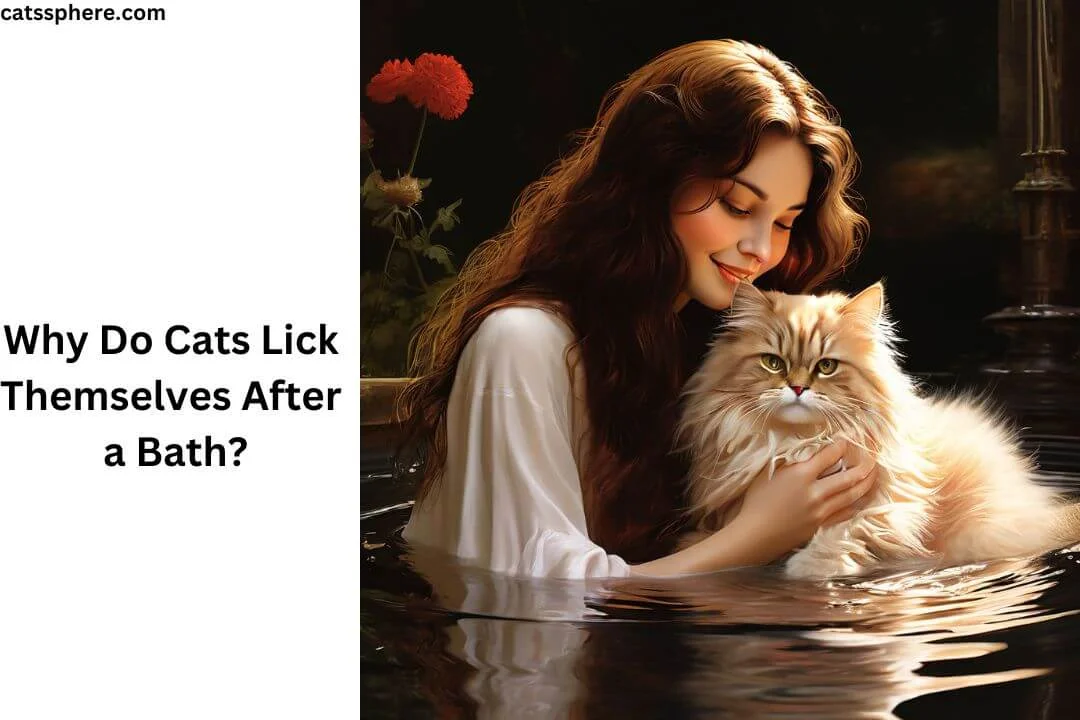Introduction
Ever wondered why your cat immediately starts licking itself after a bath? If you’re a cat owner, you’ve probably noticed this curious behavior and asked yourself, “Why do cats lick themselves after a bath?” Understanding the reasons behind this can offer valuable insights into your feline friend’s world. Let’s dive into the fascinating world of cat grooming to uncover the reasons behind this behavior.
The Nature of Cat Grooming
Instinctual Behavior
Cats are natural groomers. From the moment they’re born, kittens learn to groom themselves and their siblings. This behavior is deeply ingrained and serves multiple purposes. Grooming is not just about keeping clean; it’s a vital part of their daily routine and well-being.
Social and Psychological Benefits
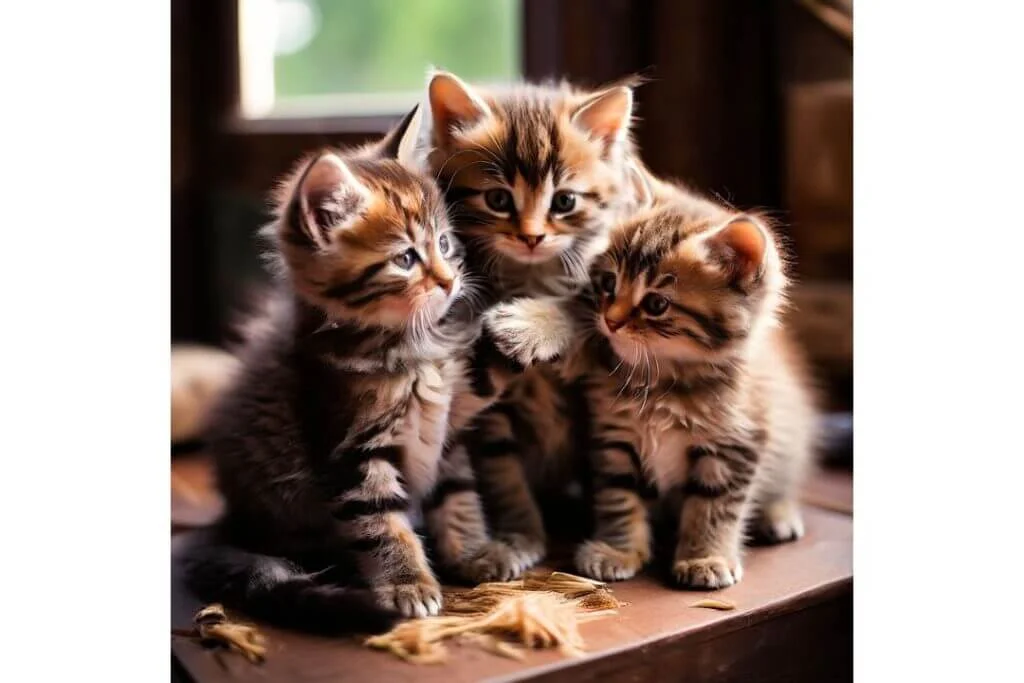
Grooming also has social and psychological benefits. In multi-cat households, mutual grooming strengthens social bonds. It’s a way for cats to show affection and establish social hierarchies. Additionally, grooming helps cats to calm down and reduce stress, providing a sense of comfort and security.
The Purpose of Licking
Maintaining Hygiene
One of the primary reasons cats lick themselves is to maintain hygiene. Their rough tongues are perfect for removing dirt, debris, and loose fur. After a bath, cats may feel the need to lick to restore their own scent and ensure they’re as clean as possible.
Regulating Body Temperature
Cats also use grooming to regulate their body temperature. By spreading saliva on their fur, they can cool down through the evaporation process. This is especially important after a bath when their fur is wet and their body temperature might fluctuate.
Spreading Natural Oils
A cat’s skin produces natural oils that keep their fur healthy and shiny. Licking helps distribute these oils evenly across their coat. After a bath, cats may feel the need to re-spread these oils to restore the natural balance and keep their fur in top condition.
Cats and Water: A Complicated Relationship
Why Cats Typically Avoid Water
Most cats are notorious for their dislike of water. This aversion is partly due to their evolutionary history. In the wild, cats didn’t have much exposure to water, and wet fur can be uncomfortable and make them feel vulnerable.
Exceptions to the Rule
However, there are exceptions. Some cats, like the Turkish Van, actually enjoy water. These breeds have developed a tolerance, or even a liking, for swimming and playing in water. But for the average domestic cat, water is more of a nuisance than a delight.
Post-Bath Grooming Explained
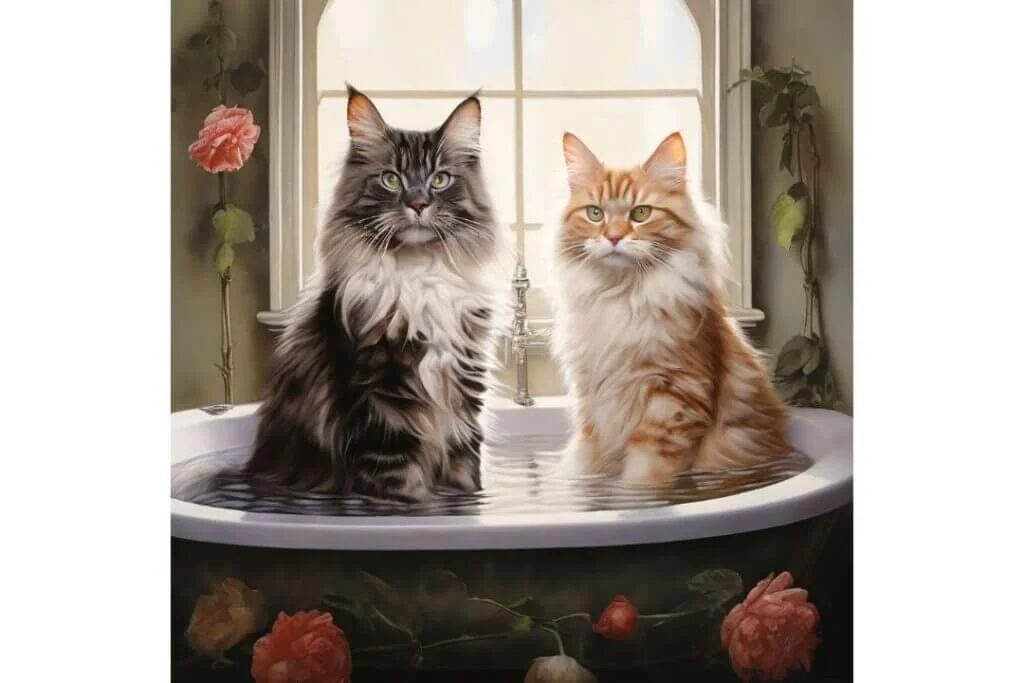
Removing Unfamiliar Scents
When you bathe your cat, you’re likely using products that have different scents. Cats have a keen sense of smell and may find these new scents disturbing. Licking helps them remove these unfamiliar odors and restore their own scent, which is comforting to them.
Restoring Fur Texture
Bathing can change the texture of a cat’s fur. It can become matted or lose its natural fluffiness. Through grooming, cats can smooth out their fur and restore its preferred texture.
Stress Reduction and Comfort
Bathing can be a stressful experience for cats. Licking themselves afterward is a way to self-soothe. The repetitive action of grooming helps them to calm down and feel more secure.
The Role of Pheromones
Understanding Feline Scent Marking
Cats use pheromones to communicate and mark their territory. When they lick themselves, they’re also spreading these pheromones. After a bath, reapplying their scent through licking is essential for them to feel at home in their environment.
The Importance of Familiar Scents
Familiar scents are crucial for a cat’s sense of security. After a bath, the new scents from shampoos or soaps can be unsettling. By licking themselves, cats work to restore their familiar scent profile, which helps them feel more comfortable.
Human Influence on Cat Grooming
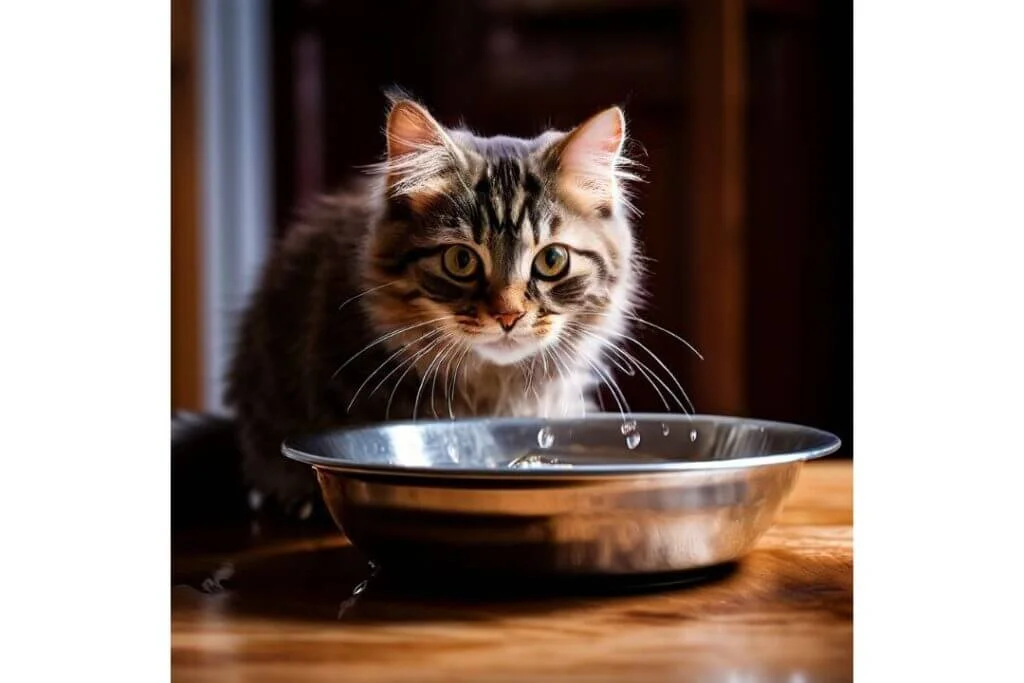

Bathing Frequency and Methods
While cats are generally good at keeping themselves clean, there are times when a bath is necessary. However, it’s essential to understand how often and how to bathe your cat correctly to avoid stress and discomfort. Regular brushing and spot-cleaning can often suffice.
Appropriate Bathing Products for Cats
Using the right products is crucial. Human shampoos and even some dog shampoos can be too harsh for a cat’s sensitive skin. Always use products specifically formulated for cats to ensure their skin and fur remain healthy.
Common Myths About Cat Grooming
Myth: Cats Never Need Baths


A common misconception is that cats never need baths. While it’s true that they groom themselves, there are situations where a bath is necessary, such as getting into something sticky or harmful.
Myth: Licking Alone Keeps Cats Clean
While licking is effective, it doesn’t always remove all dirt and debris, especially if the cat has a skin condition or has gotten into something particularly dirty. Regular grooming by their owners can help maintain their cleanliness and health.
Signs of Over-Grooming and When to Be Concerned
Identifying Over-Grooming
Over-grooming can be a sign of stress, allergies, or skin conditions. If you notice your cat grooming excessively, it’s essential to investigate the cause. Bald spots, sores, or redness are indicators that something might be wrong.
Potential Health Issues
Over-grooming can lead to skin infections and other health problems. If you suspect your cat is over-grooming, a visit to the vet is warranted to rule out medical issues and find a solution.
How to Help Your Cat Post-Bath



Creating a Stress-Free Environment
After bathing your cat, ensure they have a quiet, comfortable space to relax. Offer them their favorite blanket or spot in the house to help them feel secure.
Offering Comfort and Reassurance
Spend time with your cat and offer gentle petting and reassurance. This can help reduce post-bath stress and strengthen your bond.
Alternatives to Bathing Your Cat
Using Grooming Wipes
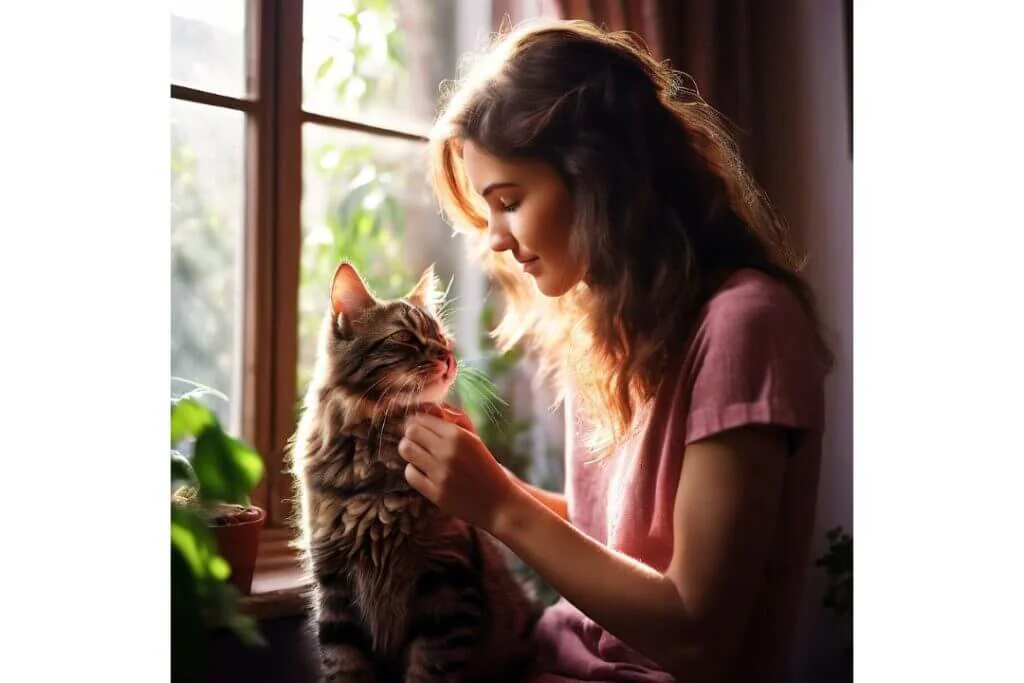

Grooming wipes are a great alternative to baths. They can help clean your cat without the stress of water and can be especially useful for spot cleaning.
Dry Shampoos and Other Products
Dry shampoos and other grooming products can also be effective. These products are designed to clean and freshen your cat’s fur without the need for water.
The Importance of Regular Grooming
Brushing Techniques
Regular brushing can reduce the need for baths and help keep your cat’s fur in excellent condition. It also helps to remove loose fur and prevent matting.
Health Benefits of Regular Grooming
Regular grooming can help detect health issues early, such as skin conditions or parasites. It also promotes healthy skin and fur by stimulating blood flow.
Ragdoll Cat Life Expectancy: A Comprehensive Guide
5 Ragdoll Cat Patterns (A Complete Guide 2024)
Ragdoll Cat Size Comparison: A Comprehensive Guide
Your Cat’s Grooming Preferences
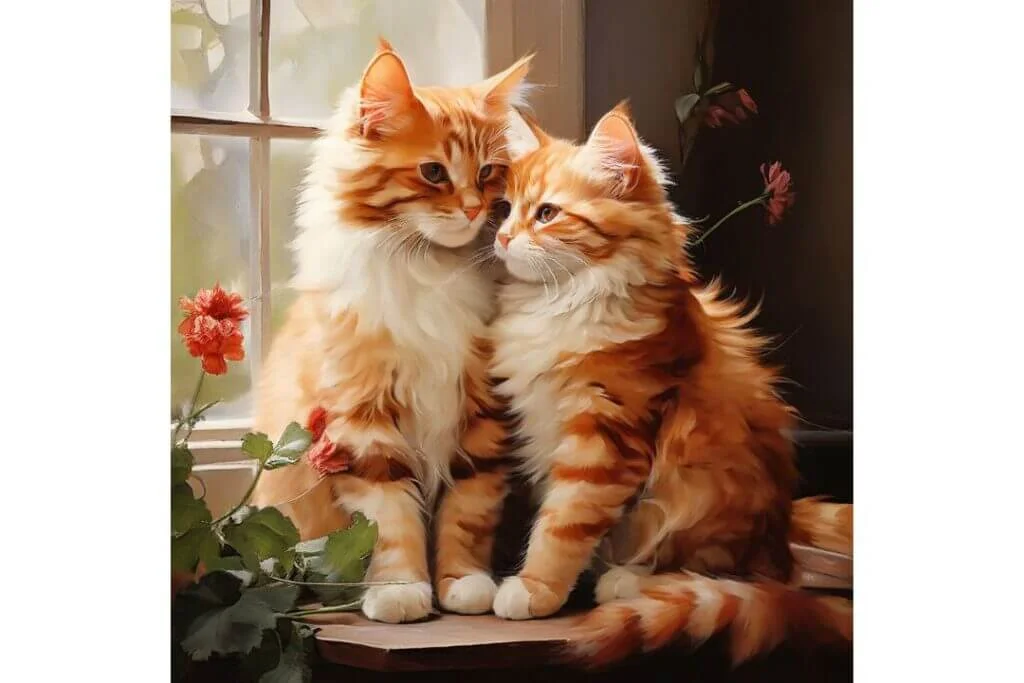

Observing Your Cat’s Behavior
Pay attention to how your cat likes to groom and what areas they focus on. This can give you insights into their grooming preferences and any potential issues.
Adapting Your Grooming Routine
Adapt your grooming routine to fit your cat’s needs. Some cats may prefer more frequent brushing, while others might benefit from occasional baths or grooming wipes.
Conclusion
Understanding your cat’s grooming habits, including why they lick themselves after a bath, can offer valuable insights into their overall well-being. This behavior is a mix of instinct, hygiene, and comfort. By recognizing and respecting these needs, you can help ensure your feline friend remains happy and healthy. Regular grooming, using the right products, and reducing stress during bath time are all essential aspects of caring for your cat’s hygiene and health.


FAQs About Cat Grooming: Detailed Guide
How often should I bathe my cat?
Generally, cats are adept at grooming themselves and usually only need a bath when they are particularly dirty or have a specific skin condition. Most indoor cats might only require a bath once or twice a year. Regular brushing is typically sufficient to keep your cat clean and help manage shedding.
What products should I use to bathe my cat?
When bathing your cat, always use shampoos that are specifically formulated for cats. Avoid using products meant for humans or dogs, as these can be too harsh and might irritate your cat’s skin. Cat shampoos are designed to be gentle and safe for their delicate skin and coat.
Why does my cat lick itself constantly?
Constant licking can be a sign of several issues. It might indicate stress, allergies, parasites, or other skin conditions. If you notice that your cat is grooming excessively, it’s essential to consult your veterinarian to determine the underlying cause and appropriate treatment.
Can I use human grooming wipes on my cat?
It’s best to avoid using human grooming wipes on your cat, as these may contain ingredients that could be harmful to your pet. Instead, use wipes that are specifically formulated for cats. These wipes are designed to be safe and effective for cleaning your cat’s fur and skin.
How can I reduce my cat’s stress during bath time?
Bathing can be a stressful experience for many cats. To help reduce stress, create a calm environment by using a quiet, warm space for the bath. Use warm water and be gentle throughout the process. Speaking softly, offering treats, and providing reassurance can also help make the experience more comfortable for your cat.

